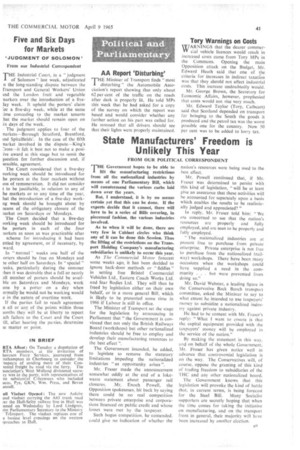State Manufacturers' Freedom is Unlikely This Year
Page 43

If you've noticed an error in this article please click here to report it so we can fix it.
FROM OUR POLITICAL CORRESPONDENT
PE Government hopes to be able to lift the manufacturing restrictions from all the nationalized industries by means of one Parliamentary Bill, which will countermand the various curbs laid down over the years.
But, I understand, it is by no means certain yet that this can be done. If the experts decide that it cannot, there win have to be a series of Bills covering, in piecemeal fashion, the various industries involved.
As to when it will be dope, there are very few in Cabinet circles who think any of it can be done this Session. Thus the lifting of the restrictions on the Transport Holding Company's manufacturing subsidiaries is unlikely to occur this year.
As The Commercial Motor forecast some weeks ago, it has been decided to ignore back-door methods or " fiddles " in setting free Bristol Commercial Vehicles Ltd., Eastern Coach Works Ltd. and Star Bodies Ltd. They will thus be freed by legislation either on their own behalf, or in a more general Bill, which is likely to be presented some time in 1966 if Labour is still in office.
The Minister of Transport set the stage for the legislation by announcing in Parliament that "the Government is convinced that not only the British Railways Board (workshops) but other neionalized industries should be free to employ and develop their manufacturing resources to the best effect ".
The Government intended, he added, to legislate to remove the statutory limitations impeding the nationalized industries "as opportunity arises ".
Mr. Fraser made the announcement somewhat oddly at the end of a lukewarm statement about passenger rail closures. Mr. Enoch Powell, the Opposition §pokesman, hit back by saying there could be no real competition between private enterprise and corporations financed on public credit and whose losses were met by the taxpayer.
Such bogus competition, he contended, could give no indication of whether the nation's resources were being used to the best effect.
Mr. Powell continued that, if Mr. Fraser was determined to persist with this kind of legislation, "will he at least give an assurance that these activities will he accounted for separately upon a basis which enables the results to be realistically judged and appreciated?"
In reply, Mr. Fraser told him: "We are concerned to see that the nation's resources are properly and fully employed, and are seen to be properly and fully employed.
" The nationalized industries are at present free to purchase from private enterprise. Private enterprise is not free to purchase from the nationalized (railway) workshops. There have been many occasions when the workshops could have supplied a need in the community . . . but were prevented from doing so."
Mr. David Webster, a leading figure in the Conservative Back Bench transport committee, asked the Minister to say to what extent he intended to use taxpayers' money to subsidize a nationalized indus-try against private industry.
He had to be content with Mr. Fraser's reply: "What I want to ensure is that the capital equipment provided with the taxpayers' money will be employed in the service of the nation.'
By making the statement in this way, and on behalf of the whole Government, Mr. Fraser has given notice well in advance that controversial legislation is on the way. The Conservatives will, of course, oppose the granting of this kind of trading freedom to subsidiaries of the TUC and any other nationalized board.
The Government knows that this legislation will provoke the kind of battle that, in current terms, is being forecast for the Steel Bill. Many Socialist supporters are secretly hoping that when the time comes for taking the initiative on manufacturing, and on the transport front in general, their majority will have been increased by another election,




































































































































